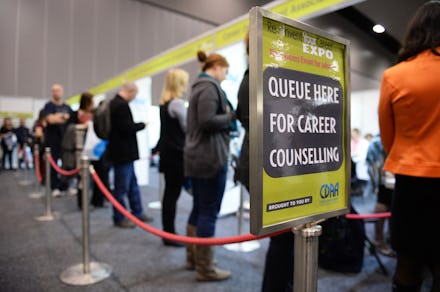Unemployment Has a Deadly Side Effect That No One Is Talking About

Sustained unemployment is often a humiliating experience, taking a tough mental and financial toll. But an analysis by University of Zurich's Psychiatric Hospital researchers published in Lancet Psychiatry has found that the consequences of losing a job or failing to get one in the first place can be even darker: Unemployment has a grisly effect on the suicide rate.
The study concludes that the economic recession that began in the late 2000s can be linked to roughly 5,000 suicides in 63 countries between 2008 and 2011. Between 2000 and 2011, the research team was able to link the unemployment rate to 45,000 suicides in those same countries — annually. The relative risk of suicides related to joblessness rose by 20% to 30%.
Unemployment accounted for about 1 in 5 of the 63 countries' 233,000 annual deaths by self-harm. Because the data didn't include numbers from China or India, the researchers writes that "suicide numbers and rates might be underestimated."
Call it "recession depression." Economists Arthur Goldstein and Timothy Diette, writing for the American Psychological Association in 2012, linked unemployment to a variety of negative psychological effects like anxiety, self-doubt, perceived helplessness and the emotionally taxing disruption of daily life. Concluding that "long-term unemployment has large negative effects on mental health," they also highlighted the lack of government policies meant to offset the psychological impact of joblessness on the general public.
CNN's Elizabeth Landau adds that unemployment doubles the chance of a major depressive episode and is closely linked to domestic violence and alcohol consumption. It's terrible, but perhaps not surprising, that many become desperate.
But the latest study indicates that unemployment's impact on the psyche is more widespread than previously thought. For one, suicides seem to rise merely in anticipation of pink slips as employees begin to worry tough economic times will damage their careers and livelihood.
"Our findings reveal that the suicide rate increases six months before a rise in unemployment," lead author Carlos Nordt told the Guardian.
"What is more, our data suggests that not all job losses necessarily have an equal impact, as the effect on suicide risk appears to be stronger in countries where being out of work is uncommon. It is possible that an unexpected increase in the unemployment rate may trigger greater fears and insecurity than in countries with higher pre-crisis unemployment levels."
Unemployment didn't discriminate, impacting people from different regions and of all ages and genders equally. In a linked Lancet comment, the University of Manchester's Roger Webb and Navneet Kapur warned that the suicide rate may be "the tip of the iceberg." For example, unemployment and related experiences like home repossession, lower income and worsening working conditions likely contribute to "other psychosocial manifestations of economic adversity, including non-fatal self-harm, stress and anxiety, low mood, hopelessness, alcohol problems, anger, familial conflict and relationship breakdown."
Why you should care: It's tough to blame any individual suicide on any specific factor — a large number of suicides are linked to mental illness, while people who take their lives may do so due to more than one specific cause. But the researchers provide compelling evidence that unemployment can be demonstrably linked to hundreds of thousands of suicides.
Assuming that the government and private sector share a responsibility to effectively manage the job market and broader economy, that means economic mismanagement is as much a moral concern as a policy failure. For example, one could reasonably link illegal or dangerous business practices by Wall Street financial institutions and economic deregulation to some of the 5,000 unemployment-related suicides triggered by the recession. Governments also have a moral responsibility to acknowledge the increased prevalence of mental health problems during tough economic times and plan accordingly.
The survey also highlights the importance of addressing unemployment as a systemic issue with serious mental health consequences for large numbers of people instead of an individual failure. Unemployed people are worthy of the same dignity and respect that others receive. The stakes are simply too high to tolerate stereotypes of them as unemployed slackers, or allow "unemployed need not apply" attitudes to go unchallenged.
If you are thinking about or considering harming yourself, or are concerned that another person may be, please call the National Suicide Prevention Lifeline at (800) 273-TALK or (800) 273-8255, which operates 24 hours a day, seven days a week. Alternately, contact a medical professional or loved one. Additional resources for dealing with suicidal thoughts can be found at metanoia.org.